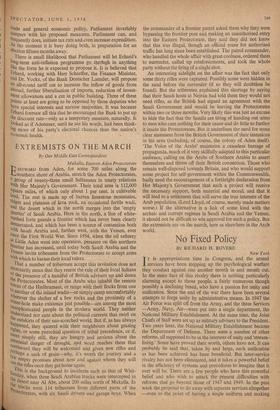GERMAN CREDIT, SQUEEZE
By Our German Correspondent
BON
DR. ADENAUER earned a deal of respect last weekend when he publicly apologised to Professor Erhard for his words in describing the Economics Minister's support for a higher bank rate as a `bad blow for the nation's prosperity.' It cannot be easy for a proud and successful statesman of eighty to stand outside in the snow and beg pardon of his junior; but Adenauer's journey to Canossa did him credit at a time when his popularity, according to the polls at any rate, had been suffering a decline. The disagreement in the cabinet, which Dr. Adenauer so surprisingly spotlighted by his speech to the Federation of German Industries, is good evidence that the German economy has got trouble ahead. Though hostilities have not yet broken out, the inflationary forces are massing on all sides. Prices are still remarkably steady, but there will be critical tension towards the end of this summer when the labour reserves will be down to bed-rock, Herr Blank will have called in the first 100,000 volunteers—consumers but no longer producers—and the Government's piled-up defence billions will have begun to hit the market. All this will come in an atmosphere of public spending which, with each hot season, seems to get evon more hectic than the year before. The throngs of new cars and motor, scooters which choke the roads and holiday resorts of Western Germany every weekend are eloquent of the material well' being. The thermal rooms at the well-known spas are packed with managers who have come to sweat off a few pounds of fat in Stakhanovite tempo and give their overworked hearts a new lease of life; yet even on the massage table the talk is often of how to expand, step up. rationalise and automatise. One well-known steel firm has had teleprinters put into its company shooting-lodge so that directors out for a roebuck at weekends can keep in touch with the latest events. The ever' lengthening order-books of the makers of capital goods shoW that business is investing heavily on the boom. In fact the nation is investing a quarter of its gross product, and that in spite of two bank-rate increases totalling 11 per cent., previous to the 1 per cent. increase of mid-May. Business is so confident of the profit margin that it will risk the higher price of loans in order to get extra capacity into production. In Germany, as in England, there is therefore some doubt as to the efficiency of bank-rate increases as a brake to the boom. But in Germany it is the best of the primitive instrti' ments in the driver's cabin and, above all, it is the one whielt, can be applied most quickly. Whereas a British Chancellor of the Exchequer is really a constitutional dictator in things economic, a German Economics Minister has to work mainly by remote control. The Finance Minister is responsible for the Budget and the customs administration; the Central Banking Council, an autonomous body, presides over the nation's credit system (though, fortunately for Erhard, it and he see eye W eye), and though the Economics Minister is responsible for trade and general economic policy, Parliament invariably tampers with his proposed measures. Parliament can, and frequently does, initiate tax cuts and even increase expenditure. At the moment it is busy doing both, in preparation for an election fifteen months away.
There is small likelihood that Parliament will let Erhard's long-term anti-inflation programme go threrugh in anything Like the form he is expected to propose it. It is believed that hrhard, working with Herr Schaeffer, the Finance Minister, and Dr. Vocke. of the Bank Deutscher blender, will propose all all-round tariff cut to increase the inflow of goods from abroad, further liberalisation of imports, reduction of invest- Merit allowances and a cut in public building. Three of these Points at least are going to be opposed by those deputies who have special interests and narrow majorities. It was because Erhard foresaw all this that he encouraged the Bank to put up the discount rate—only as a temporary measure, naturally. It looked as if Adenauer, until he ate his words, had been think- ing more of his party's electoral chances than the nation's economic health.



































 Previous page
Previous page